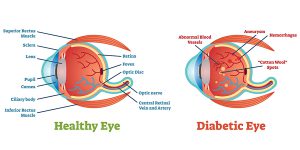Diabetes is a disease where there is too much sugar or glucose in the bloodstream. This condition can lead to a variety of health problems for those who have been diagnosed, including issues with vision that can lead to blindness if not treated.
The Centers for Disease Control’s latest statistics for 2020 indicate that over 34 million adult Americans — over 10% of the population — have been diagnosed with diabetes. A staggering 88 million adults (34%) have been diagnosed with prediabetes. That means that nearly 45% of the United States adult population is affected by this disease.
How can it Affect Your Eyes?
When there’s too much sugar in the bloodstream, it begins to cause damage throughout the body via tiny blood vessels. When the vessels become too saturated, they swell and begin to leak blood and other fluids. For the eyes, this leakage causes cloudy or blurred vision. If left untreated, it can lead to other, more serious conditions, on up to blindness. Here are those conditions (click on the links to learn more about them):
- Cataracts (diabetics are 2-to-5 times more likely to develop cataracts and at a younger age).
- Glaucoma (diabetes doubles the risk of open-angle glaucoma).
- Diabetic Retinopathy:
- Non-Proliferative (early/mild stages where blood vessels are bulging and may start to leak).
- Proliferative (advanced stages of diabetic retinopathy that can lead to detached retina).
What to Watch For
The American Diabetic Association recommends that if you start to notice the following symptoms, schedule an appointment for a comprehensive eye exam with your eye care provider:
- Increased floaters.
- Blurred vision.
- Dark or empty spot in the center of your vision.
- Hard to see at night.
How to Prevent or Treat
As mentioned above, the first step for prevention and/or treatment is getting a comprehensive eye exam. During this exam, the eyes are dilated with drops, which allows the doctor to see if the blood vessels at the back of the eye are inflamed. For many people, this exam is where they first learn that they may have diabetes! Please note that if diabetes has already been diagnosed, you should schedule more frequent eye exams during the year to monitor how it is affecting your eyes.
The good news is that the treatment for diabetes will affect the whole body, not just the eyes. Diet, exercise, avoiding alcohol, and if needed, taking medication, go a long way toward controlling — and even reversing — diabetes.
As always, maintaining good nutrition and exercise habits along with regular check-ups will help to keep you — and your eyes — healthy.


